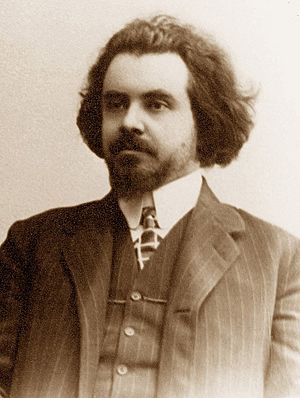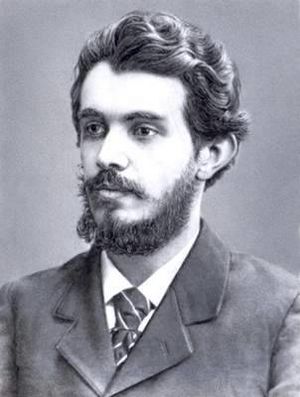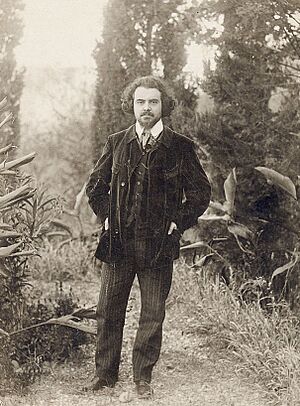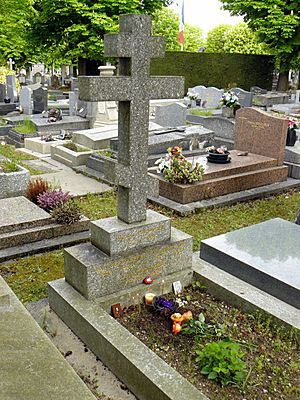Nikolai Berdyaev facts for kids
Quick facts for kids
Nikolai Berdyaev
|
|
|---|---|
 |
|
| Born |
Nikolai Alexandrovich Berdyaev
18 March 1874 Obukhov, Kiev Governorate, Russian Empire
|
| Died | 24 March 1948 (aged 74) |
| Era | 20th-century philosophy |
| Region | Russian philosophy |
| School | Christian existentialism, personalism |
|
Main interests
|
Creativity, eschatology, freedom |
|
Notable ideas
|
Emphasizing the existential spiritual significance of human freedom and the human person |
|
Influences
|
|
Nikolai Alexandrovich Berdyaev (/bərˈdjɑːjɛf, -jɛv/; Russian: Никола́й Алекса́ндрович Бердя́ев; 18 March [O.S. 6 March] 1874 – 24 March 1948) was an important Russian philosopher and theologian. He was known for his ideas on Christian existentialism. This means he focused on the spiritual meaning of human freedom and the importance of each person. His last name is sometimes spelled "Berdiaev" or "Berdiaeff." His first name can also be "Nicolas" or "Nicholas."
Contents
Life Story of Nikolai Berdyaev
Early Life and Education
Nikolai Berdyaev was born in 1874 near Kiev, a city in what was then the Russian Empire. His family was aristocratic, meaning they belonged to a high social class. His father's family had many high-ranking military officers. His mother was partly French and came from important French and Russian noble families. Nikolai also had Polish and Tatar ancestors.
Nikolai decided he wanted to be an intellectual. He started studying at Kiev University in 1894. At that time, many students and thinkers were interested in revolutionary ideas. For a while, Berdyaev became a Marxist. He was arrested during a student protest and had to leave the university. Because he was involved in these activities, he was sent away to Vologda in northern Russia for three years in 1897.
Challenges and Exile
In 1913, Berdyaev wrote a strong article called "Quenchers of the Spirit." In it, he criticized how the Russian Orthodox Church handled some Russian monks. He was charged with blasphemy, which was a very serious crime. The punishment for this crime was usually being sent to Siberia for life. However, World War I and the Bolshevik Revolution happened, so his trial never took place.
In 1919, Berdyaev started his own private school. He called it the "Free Academy of Spiritual Culture." It was a place where he could give talks on important topics. He shared his Christian views on these subjects. He also gave public lectures. Every Tuesday, the academy met at his home. This was because the Soviet government was very strict against religion at the time. They promoted state atheism, which means they wanted people not to believe in God.
In 1920, Berdyaev became a philosophy professor at the University of Moscow. That same year, he was accused of working against the government. He was arrested and put in jail. Felix Dzerzhinsky, the powerful head of the secret police (called the Cheka), came to question him. Berdyaev bravely told Dzerzhinsky what he thought was wrong with the Bolshevik government. The writer Aleksandr Solzhenitsyn wrote about this event. He said that Berdyaev did not give up his beliefs. Because of this, he was set free instead of being put on trial.
Life in Europe
After being forced to leave Russia, Berdyaev and other Russians moved to Berlin. There, he started another academy for philosophy and religion. But times were tough in Germany, so he and his wife moved to Paris, France, in 1923. He continued his academy there. He taught, gave lectures, and wrote many books. He worked to share ideas with thinkers in France and other parts of Europe. He also took part in many international meetings.
Nikolai Berdyaev's Ideas
Key Philosophical Concepts
Nikolai Berdyaev was known for his strong and independent ideas. He often challenged common beliefs. He believed that people connect two worlds: the divine (spiritual) and the natural. He thought that through freedom and creativity, these two parts of human nature could come together. He felt that creativity was the way to overcome the separation in life.
His philosophy is often called Christian existentialism and personalism. This means he believed in the importance of individual freedom and the unique value of each person. Other thinkers have described him as a "communitarian personalist" and a Slavophile. This means he valued both the individual and the community, and he had a special love for Russian culture. His main ideas were about freedom, creativity, the human person, and community.
Love and Russian Identity
One of Berdyaev's main topics was the philosophy of love. He first wrote about his ideas on love in an article in 1907. He also discussed gender topics in his 1916 book, The Meaning of the Creative Act.
He also wrote a lot about Russian history and the unique character of the Russian people. He discussed Russian nationalism. He believed that the Russian people had a special destiny. He wrote that instead of Russia becoming the "Third Rome" (a spiritual center), it became the "Third International." This was a reference to the Communist movement. He saw some similarities between the old religious idea and the new revolutionary one.
Berdyaev also supported Christian anarchism. This is a belief that Christians should not follow human governments but only God's laws.
His Faith and the Russian Orthodox Church
Connection to Orthodoxy
Nikolai Berdyaev was a member of the Russian Orthodox Church. He believed that Orthodoxy was the closest form of Christianity to the very first Christian communities. He felt that the Orthodox Church had changed the least over time.
Even though he was Orthodox, he was a very independent thinker. He sometimes criticized the Russian Orthodox Church. He described his views as anticlerical, meaning he was against the power of the clergy. However, he always felt closer to Orthodoxy than to other Christian groups like Catholicism or Protestantism. He said he never broke his connection with the Orthodox Church.
His Influence and Legacy
Berdyaev is often seen as one of the most important Russian Orthodox thinkers of the 20th century. However, some scholars have debated if his ideas were truly Orthodox or if they were more influenced by Western thought.
Berdyaev believed in universal reconciliation, which means he thought that all people would eventually be saved by God. This idea was also discussed by other important Orthodox theologians. He helped bring attention back to the Orthodox teaching of apokatastasis, which is the idea of the restoration of all things.
After the Russian Revolution, the Russian Orthodox Church faced many challenges. Many Russian Orthodox communities outside Russia split into different groups. Berdyaev chose to stay connected to the Moscow Patriarchate. He is remembered for supporting this part of the church in Western Europe.
Today, the house where Berdyaev lived in Clamart, France, is a small museum dedicated to him. It also has a chapel. On the 70th anniversary of his death in 2018, special prayers were held for him at the chapel and at his grave.
Major Works by Nikolai Berdyaev
Nikolai Berdyaev began his writing career in 1901. He wrote about how Russian Marxism changed. He noted that some Marxists became interested in spiritual and religious ideas. He wrote more than 20 books and many articles.
Here are some of his important works (the first date is the Russian edition, the second is the first English edition):
- Subjectivism and Individualism in Societal Philosophy (1901)
- The New Religious Consciousness and Society (1907)
- The Meaning of the Creative Act (1916; 1955)
- Dostoevsky: An Interpretation (1921; 1934)
- The Meaning of History (1923; 1936)
- The End of Our Time (1924; 1933)
- The Destiny of Man (1931; 1937)
- The Origin of Russian Communism (1937; 1955)
- Slavery and Freedom (1939)
- The Russian Idea (1946; 1947)
- Dream and Reality: An Essay in Autobiography (1949; 1950)
- Sources
- '"Bibliographie des Oeuvres de Nicolas Berdiaev" établie par Tamara Klépinine' published by the Institut d'études Slaves, Paris 1978
- Berdyaev Bibliography on www.cherbucto.net
- By-Berdyaev Online Articles Index
See also
 In Spanish: Nikolái Berdiáyev para niños
In Spanish: Nikolái Berdiáyev para niños
- Christian philosophy
- Vladimir Soloviev
- Sergei Bulgakov
- Semyon Frank
- Pavel Florensky
- Fyodor Dostoevsky
- Søren Kierkegaard
- List of Russian philosophers
- Nikolai Lossky
- Orthodox Christian theology
- Russian Religious Renaissance
- Vekhi
 | Precious Adams |
 | Lauren Anderson |
 | Janet Collins |




